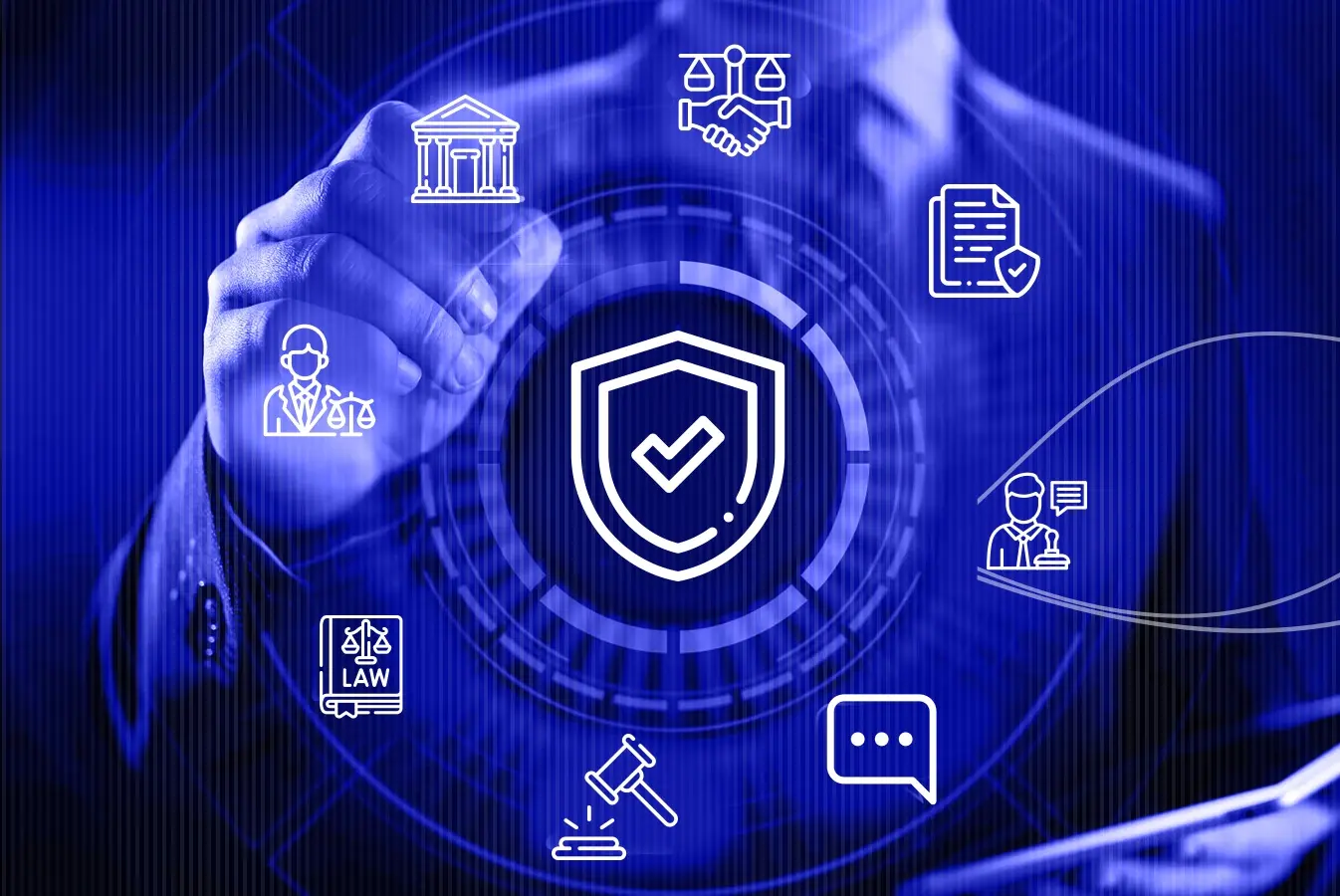Secure Evidence Management: Building Trust in Legal Systems
by VIDIZMO Team, Last updated: June 30, 2025, ref:

Evidence in legal proceedings consists of susceptible information which can only be disclosed to professionals assigned to the case. Effective and secure evidence management, therefore, becomes necessary.
Without appropriate protocols to protect the confidentiality and integrity of sensitive evidence, hard-found evidence can be compromised and likely rendered inadmissible by a court of law.
The U.S. Department of Justice demands that appropriate evidence security protocols be met with an evidence management system for handling sensitive digital evidence.
They highlight that comprehensive evidence software can help prevent tampering with evidence and ensure its admissibility in court. This ensures that a fair trial is in order, enhancing trust and integrity in the legal justice system.
We're here to simplify evidence management for you with a centralized solution: A digital evidence management system (DEMS) that allows you to ingest, manage, analyze, and preserve digital evidence securely in a single repository.
We'll discuss why evidence must be kept secure for legal proceedings and how a DEMS can help secure digital evidence for your legal agency.
However, if you are stressed for time, jump to our 7-day free trial (no credit card required) and test it yourself!
Why is Secure Evidence Management Necessary in Legal Proceedings?
Secure evidence management throughout the lifecycle is crucial, from when it is collected to its presentation in legal proceedings.
The National Institute of Justice reinstates this by highlighting that digital evidence is fragile and can be altered, damaged, or destroyed by improper handling or examination.
This is why strict attention is given to securing evidence in a manner that it remains intact at all times.
Ensuring Evidence Integrity in Court for Effective Evidence Management
Any court or judge would not accept tampered evidence or one that cannot be traced back to its collection. This is why secure evidence management is so crucial.
It ensures that the presented evidence has not been altered or tampered with. Therefore, it is imperative for all parties involved, from law enforcement to legal professionals, to prioritize the security of evidence throughout its lifecycle.
Preserving Trust in Legal Systems
Trust is a fundamental aspect of any legal system, and it is built on the reliability and credibility of the evidence presented in court.
When evidence is secure and its integrity is maintained throughout its lifecycle, it reinforces the public's trust in the legal system.
Conversely, any compromise in evidence security can significantly erode this trust, leading to a loss of confidence in the legal system.

How does a Digital Evidence Management System ensure Evidence Security for Legal Proceedings?
We've effectively covered why evidence security is vital for legal proceedings. Now, let's discuss exactly how that can be achieved through evidence software such as a digital evidence management system.
Tamper Detection Mechanisms
The involvement of multiple professionals in legal cases often requires the transfer of digital evidence from one computer to another.
This movement makes the evidence vulnerable to tampering or mishandling, possibly resulting in accidental deletion.
That's precisely why creating unique hashes of the original evidence is crucial. These hashes can help determine whether the evidence has been altered or deleted.
The National Institute of Standards and Technology (NIST) published key considerations for evidence handlers, highlighting the importance of storing hashes or digital signatures of digital evidence to make sure evidence has not been tampered with.
A digital evidence management system offers tamper detection mechanisms, using unique hashes for evidence files, making it easy to check if any changes have been made to the evidence and by whom.
Audit Trails and Chain of Custody
Principle 3 of the ACPO Good Practice Guidelines for Digital Evidence emphasizes that an audit trail or other record of all processes applied to digital evidence should be created and preserved.
An audit trail is essential to track any movement, access, and possession of digital evidence, which makes it credible and secure before it can be presented in legal proceedings.
A digital evidence management system offers comprehensive audit trails and chain of custody reporting for digital evidence, ensuring it can be traced throughout its lifecycle.
Role-Based Access Control
Legal teams are comprised of multiple professionals working at different levels, from minor legal roles like paralegals and associate attorneys to more senior positions like attorneys and prosecutors.
It's imperative that only individuals assigned to the case have access to sensitive information and no one else.
A digital evidence management system's role-based access control feature serves as an ideal solution for this problem, assigning users access based on their roles within the system.
This ensures that each team member has precisely the level of access required for their role, safeguarding the security and integrity of the digital evidence.
Limited and Restricted Evidence Sharing
Legal cases often involve the participation of multiple parties, from law enforcement officials to legal professionals, requiring appropriate legal evidence handling.
Considering the sensitive nature of digital evidence, it must only be shared for a limited time while keeping it restricted to only concerned parties assigned to the case.
A digital evidence management system allows easy and secure sharing of digital evidence using tokenized, time-bound URLs, allowing professionals to share sensitive information for a limited period.
This feature, paired with other important features like tamper detection and access controls, ensures the highest levels of security and integrity of evidence.
Access-Reason Provisioning
Principle 2 of the ACPO Good Practice Guidelines for Digital Evidence highlights that any person accessing original data must give a valid reason for access, explaining the relevance and implications of their actions.
In legal proceedings, it's not just important to control who has access to evidence but also to understand why they need access. Without proper justification, the risk of mishandling or misuse of evidence increases.
Access-reason provisioning is implemented in a digital evidence management system to address this challenge.
This feature requires users to provide a valid reason for accessing the evidence, creating an additional layer of accountability.
It ensures that every access to the evidence is justified and recorded, further strengthening the security and credibility of the digital evidence.
Encryption
The NIST guidelines for evidence preservation emphasize that insiders can accidentally or maliciously disclose digital evidence regardless of security measures.
They suggest encrypting data when stored is the most robust protection against such circumstances.
This is where evidence software such as a digital evidence management system comes into play, offering robust security features like encryption.
Encryption scrambles data into a format that can only be read with a key. This protects the evidence from unauthorized access, ensuring its integrity and confidentiality.
Try out these features yourself in a free digital evidence management system trial.
Click here to explore some best practices for securing and preserving digital evidence.
VIDIZMO: Your Secure Evidence Management Solution
Let's help you understand why VIDIZMO serves as the ideal choice for an evidence management software provider:
- Extensive Features: Experience a variety of effective digital evidence management features tailored to meet your needs.
- Security and Adherence to Compliance: Crafted to assure evidence security, integrity, chain of custody, and compliance with legal standards such as FERPA, GDPR, FIPS, and CJIS.
- Metadata and Search Capabilities: Facilitating seamless addition of metadata for streamlined evidence search and retrieval.
- Flexible Deployment Options: Investigate a range of deployment choices that align with your organization's requirements and budget.
All in all, legal professionals must ensure that any digital evidence, whether relevant or irrelevant to cases, must be treated with the utmost confidence and security.
Without proper security protocols to protect digital evidence, it becomes susceptible to tampering or mishandling, rendering it potentially inadmissible in court.
We invite you to try a free seven-day trial of our evidence software today and see it firsthand.
Ready to revolutionize your evidence management? Reach out to us now to discover how we can empower your agency.
Frequently Asked Questions (FAQ's)
Is digital evidence admissible?
Digital evidence is admissible in court, provided it meets specific criteria. It must be relevant to the case, authentic, and unaltered during the forensic process. Additionally, the results of the forensic examination must be valid.
How do you secure digital evidence?
Securing digital evidence involves several key steps. These include ensuring your workstation is secure, encrypting all data, maintaining a detailed chain of custody for the evidence, and employing tamper detection mechanisms to safeguard the integrity of the evidence. These steps will help ensure effective evidence management.
What are the different methods to secure evidence?
There are numerous methods to secure evidence. These encompass legally obtaining the evidence, taking detailed notes, packaging the evidence properly for identification and storage, maintaining a rigorous chain of custody, and ensuring the evidence is secure and tamper-proof.
Can digital signatures be forged?
Digital signatures cannot be forged if the associated digital certificate is valid and the private key is kept secure. This ensures the authenticity of the digital signature, thereby preventing unauthorized access or alterations.
Jump to
You May Also Like
These Related Stories

Choosing the Right Police Evidence Management Software for Your Agency

Simplifying Video Evidence Management with Digital Evidence Management System





No Comments Yet
Let us know what you think